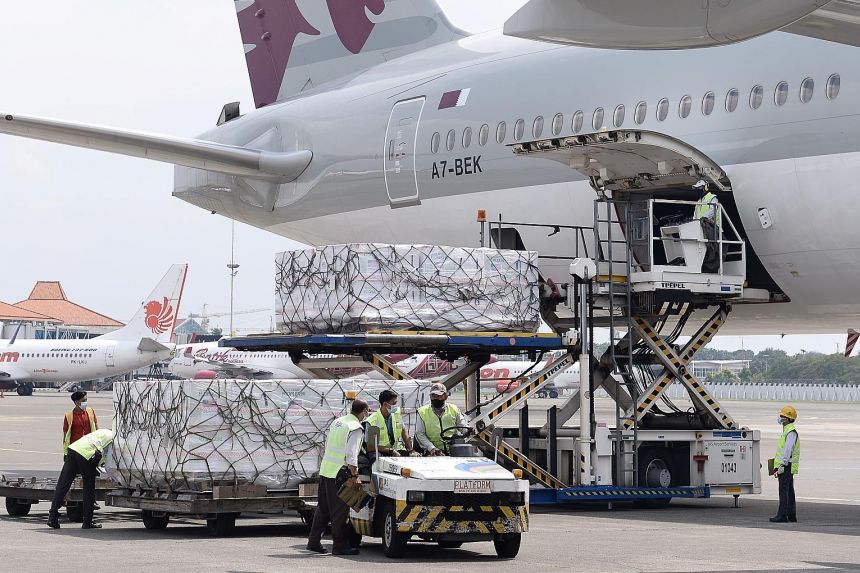Private sale of Covid-19 vaccine in Indonesia delayed amid protests
Sign up now: Get insights on Asia's fast-moving developments

Workers at Indonesia's Soekarno Hatta International Airport in Tangerang unloading Moderna vaccines on July 11.
PHOTO: REUTERS
JAKARTA - A controversial plan by Indonesia's state-owned pharmaceutical company PT Kimia Farma to sell the Covid-19 vaccine has been delayed.
The planned sale, which was due to begin on Monday (July 12), met with high demand but triggered angry protests by health activists and parliamentarians who insisted that vaccines should be administered free of charge.
"We will provide more information further," Kimia Farma's corporate secretary Ganti Winarno Putro said in response to a query from The Straits Times about the delay.
In a statement later Monday, the company blamed the huge interest generated by the move for the delay, saying it would allow Kimia Farma to spend more time disseminating information about it and better prepare a registration system for interested individuals.
Indonesia, Southeast Asia's most populous country, has fully vaccinated about five per cent of its 270 million population as it grapples with soaring Covid-19 cases.
The government hopes to achieve herd immunity by the end of the year through a public vaccination programme combined with a private campaign organised by the Indonesian Chamber of Commerce and Industry and bankrolled by the participating companies to get their employees inoculated sooner.
The government initially set aside 40,000 doses of the Sinopharm vaccine for use in the private vaccination programme which cost 879,140 rupiah (S$82) for two doses, inclusive of administering fees, in Java and Bali. The private programme was expected to be expanded to other regions of the country later.
A senior government official told ST last month that the private vaccination campaign would not impede the free public one.
The costs saved could be rechanneled to the government's annual aid programme for the underprivileged to mitigate the economic fallout from the pandemic, the official added.
Indonesia started rolling out its free national vaccination programme in mid January and more than 90 per cent of the vaccine administered so far has been Sinovac which was developed by China. AstraZeneca, developed by the United Kingdom, and China's Sinopharm made up the remaining 10 per cent. It received the first consignment of the Moderna vaccine from the US on Sunday.
Responding to the planned private programme, Ms Diah Saminarsih, senior adviser on gender and youth for the director general of the World Health Organization, said that it would be against the equitable distribution of vaccines.
"It is premature to do it now. Our overall vaccination rate is still far from the target. The paid-vaccine shouldn't be an option now, but later," Ms Diah said in a webinar on Monday (July 12) organised by Jakarta-based Center of Indonesia Strategic Development Initiatives (CISDI), a think tank that promotes better public health services in Indonesia.
Mr Saleh Daulay, a member of Parliament's health committee, also took issue with the government for not discussing the private programme with the committee prior to announcing it. He reminded President Joko Widodo of his earlier commitment to provide free vaccines for all.
The government aims to inoculate 181.5 million people, or 67 per cent of the population, by the end of this year and police as well as military personnel have been mobilised across the country's 34 provinces to help administer the jabs. Indonesia has managed to boost its vaccination rate to more than one million doses a day.
"Right now, any programme, be it private vaccine or whichever programme, we do give our support. We are racing with time," West Java governor Ridwan Kamil told Monday's CISDI webinar.
He disclosed that his administration will later this week deploy mobile vaccination vehicles, accompanied by ambulances, to boost inoculations in remote areas of the province as well as of the elderly, many of whom have shunned getting the jab.
Indonesia is in the grip of a fresh Covid-19 wave with the number of daily cases topping 40,000 for the first time on Monday, bringing the total number of cases to 2.57 million for the worst hit country in Southeast Asia. There were 891 new deaths reported in the past 24 hours, taking the death toll to 67,355 as of Monday.
Indonesia's vaccine supplies
Total number of doses received: 122.7 million
Types of vaccines:
108.5 million - Sinovac
9.2 million - AstraZenaca
2.0 million - Sinopharm
3.0 million - Moderna
9.2 million - AstraZenaca
2.0 million - Sinopharm
3.0 million - Moderna
NOTE: The government aims to inoculate 181.5 million people, or 67 per cent of the population, by the end of this year


